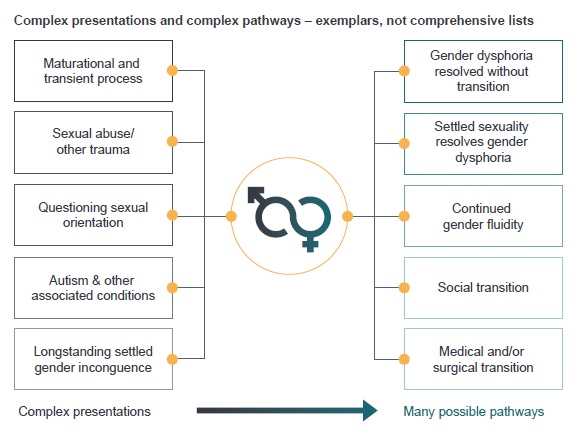Apologies in advance for another epic thread, but hopefully this will underscore that differences of opinion on the wisdom of the proposed conversion therapy legislation are not a case of "pure, cold-eyed evil" (thanks Philip Pullman) versus enlightened progressives. 2/20
Those questioning the bill have immersed themselves in the detail: consultation documents, multiple reference studies, a range of responses pro & contra, the interim Cass Review. Before you dismiss them, do them the honour of a similar breadth of research. 3/20
The first thing to understand is that people with qualms about the transgender aspect of the bill are not "in favour of conversion therapy". (Sigh - this should be obvious, but Twitter loves a cheap insult, so it needs saying.) 4/20
A vital question to ask is whether the term "conversion therapy" is even applicable in this context, but to answer that we need to address a more fundamental problem: what did the original proposals mean by "being transgender". 5/20
The lack of definitional clarity over what is meant by "being transgender" is the crux of the problem with the entire bill. The question for legislators is how to define "being transgender" so they could outlaw attempts to convert someone to or from this state. 6/20
There are a couple of options. One is to tie a definition to "having gender dysphoria", but this is not popular with trans lobby groups who seek to de-medicalise trans (while simultaneously demanding easier access to "trans healthcare"). 7/20
Any definition of "being transgender" that links to gender dysphoria quickly reveals the risk of the bill impinging on holistic therapeutic support for people in distress. This is unlikely to wash, especially as Cass acknowledges the multiple causes of gender incongruence. 8/20
The second option for defining "being transgender" is to link it to having a "gender" (i.e. a "gender identity") that does not match the individual's sex. The belief/lack of belief in an internal "gender identity" cuts to the heart of the current sex/gender debate. 9/20
Legislators are rightly nervous about cementing in the statute a belief-based system (that we all have an internal "gender identity") & requiring everyone to subscribe to that belief. "Gender identity" currently has no status in UK law: introducing it is a serious step. 10/20
Crucially, protecting trans people against discrimination does not require "gender identity": the protected characteristic "gender reassignment" in the Equality Act offers protection without this concept. The Gender Recognition Act does not refer to "gender identity". 11/20
Nor does explaining and treating gender dysphoria require a belief that everyone has an internal gender that can be misaligned from our sex. This is important: not all trans or gender dysphoric people subscribe to gender identity theory or find it helpful. 12/20
Still, you might say that no-one should be pressurised in or out of their personal identity, whether that's a belief in an internal gender or anything else. But there is a major caveat for "gender identity": namely medicalisation. This particular identity has consequences. 13/20
No other aspect of individual identity is tied to lifelong medicalisation and irrevocable surgical interventions, with gender identity advocates declaring that children can be so sure of their inner gender that age should be no barrier to such decisions. 14/20
Slogans about being your "authentic self" or trans being "a sacred journey of becoming whole" (looking at you, senior church leaders) skip conveniently over the paltry clinical evidence for cross-sex hormone treatments & double mastectomies or the risks of gonadectomy. 15/20
The NHS NICE surveys of GnRH analogues and cross-sex hormones are not a pithy read, and the conclusion that the available evidence is very weak does not make for a catchy tweet to garner likes or a clickable newspaper headline. 16/20
The medical consequences of a trans declaration mean the utmost caution is required to legislate here. I'm no fan of the current government, but at least they have realised that bad legislation, no matter how well-meaning, comes with reputational damage and can cause harm. 17/20
Mounting evidence from desisters/detransitioners undermines claims that "being transgender" is just something you are & not subject to external influence or likely to change. We ignore their accounts at our peril. 18/20
Cass describes how "parents and carers play a huge role and are instrumental in helping young people to keep open their developmental opportunities." As originally proposed, the bill risked making such interventions prosecutable as "attempts at conversion". 19/20
Criminalising parents who reject the idea that their child's distress is caused by a misaligned internal gender identity would have had the potential for immense harm. It's not catchy, but complexity rarely is. END. 20/20























